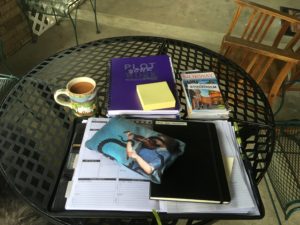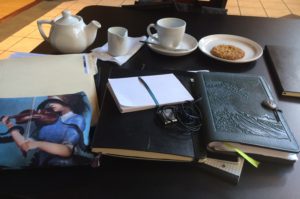I had to change my lawnmower blade recently after an unfortunate run-in with the curb. If you’ve never broken a lawnmower blade, I do not recommend it. The unbalanced blade creates havoc, and the best thing you can do is just shut the whole thing down and let the engine cool off before you attempt a repair.
If I had to choose an image of my brain when I am between writing projects, this would be it.
My ADHD brain is a wild, out-of-control machine tearing up the ground without really doing anything.
Like most writers, I feel out of sorts when I’m not writing. My mind is full of what-ifs and storylines most days, but it’s overwhelming when I don’t have a project in progress. The amazingly wonderful editor Alissa McGowan offered some of her precious time to talk about writing.
We talked for well over an hour about all the different projects I had banging around in my brain. Near the end of our time, after Alissa had patiently listened to me rattle on about no less than five fiction and a non-fiction project I have been thinking about, she said the magic words. “Do the thing you are most passionate about right now.”
That was like a new blade for my mower. The plot idea that had been a fuzzy image came into sharp focus. After much preparation, including character sketches, scene card sorting and playlist creation, I started the fourth book in the University Square series.
Thank you, Alissa, for being generous with your time and for your encouragement. And if anyone else is struggling with choosing their next project. Follow Alissa’s advice: Do the thing you are most passionate about. 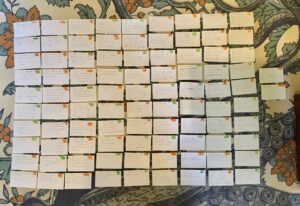
Category Archives: Writing Tips
Creating in Chaos
Its been a while since I’ve posted here. I have been like many I suspect, overwhelmed. And unsure I had anything to add to the discussion of how to adjust to our lives with the specter of Covid-19 looming over us. My family has been sheltering in place for about three weeks now. It’s been an adjustment. After suffering the loss of my brother in law last year, I finally felt we had all adjusted to the new normal. And then we found ourselves in the middle of a global pandemic.
In the past week we, (my wife, my kids and I) have snuggled on our couch, struggled with classroom technology and homeschooling, played outside, started garden, planted seeds, raged, cried, lay in our beds and stared at the ceiling, laughed at ridiculous movies, called family and friends, played games, helped each other with chores and housework, and eaten our share of our favorite snacks and desserts. We are surviving.
I sent a new manuscript off to my editor right before all of the chaos started and I’m grateful I had competed it because I have been unable to get myself to sit down to write until today.
I have a new novella project that I need to start working on. I know I’m not going to hit my usual word counts. I not even going to try. I’m permitting myself to go slowly, to adjust my writing pace to meet my deadline on time but not early. I’m also permitting myself to take days off when I need them for emotional and mental health. My imaginary friends have always been my go-to in any crisis, and I believe that once I get back to writing, I will feel better. How are you all doing? Are you able to create right now? Do you have any tips to share?
Until next time, stay safe, stay well.
Brenda Murphy writes short fiction and novels. She loves tattoos and sideshows, and yes, those are her monkeys. When she is not loitering at her local tea shop and writing, she wrangles two kids, one dog, and an unrepentant parrot. She reviews books, blogs about life as a writer with ADHD and publishes photographs on her blog Writing While Distracted.
You can find her on Facebook by clicking here. Sign Up for her email list and receive a free erotic short story HERE Check out more information about her upcoming releases and appearances at www.brendalmurphy.com
Books available at
Writing as Gardening: Tending Your Creative Soul
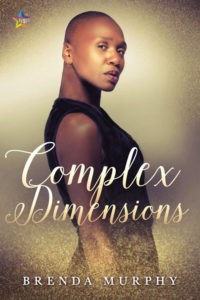 It’s been a while since I’ve posted. My novel Complex Dimensions released in September, and then I attended Surrey International Writer’s Conference, and now I’m amid National Novel Writing Month (NaNoWriMo). For anyone that doesn’t know, NaNoWriMo is an annual quest to write 50,000 words in November. I have participated in the last few years, and those novels have gone on to be published. I always count on NaNoWriMo to help me meet my goal of completing two manuscripts a year for submission. The concept of planing your writing/creative projects from a year-round perspective is what keeps me sane in a world that thrives on production at all costs. I young kids at home, and my creative schedules revolve around the school year. I also like to give myself a break around Christmas and New Year’s to spend time with my family.
It’s been a while since I’ve posted. My novel Complex Dimensions released in September, and then I attended Surrey International Writer’s Conference, and now I’m amid National Novel Writing Month (NaNoWriMo). For anyone that doesn’t know, NaNoWriMo is an annual quest to write 50,000 words in November. I have participated in the last few years, and those novels have gone on to be published. I always count on NaNoWriMo to help me meet my goal of completing two manuscripts a year for submission. The concept of planing your writing/creative projects from a year-round perspective is what keeps me sane in a world that thrives on production at all costs. I young kids at home, and my creative schedules revolve around the school year. I also like to give myself a break around Christmas and New Year’s to spend time with my family.
When I plan my new work for the year, I enter significant commitments into my calendar first. Trips I have scheduled and conferences I plan to attend, family time, and self-care, all the things that fill my creative well, and let me come back to the blank page ready to write are my priorities when planning my work.
I have known too many writers who burn out and find themselves blocked, unable to write a thing because of pushing themselves to meet someone else’s idea of productivity.
So what does this have to do with gardening? I have a garden, and as part of taking care of it, I put it to bed when the weather turns by adding leaves and other organic matter and then covering it, trusting that everything will mellow and break down over the winter. I will have a lush soil to grow in when spring arrives. Some people grow things year-round, using covers and greenhouses and force their gardens to keep producing, but crucial to their success is to rotate their plantings, taking time to let some parts of their garden recover.
Much of writing is providing time for your mind to create, to think, and to wonder ‘what if?’. Taking time to reset and recover is essential after a considerable period of productivity.
Read, take walks, draw, paint, listen to music, hang out with your family and friends, visit museums, and travel. Do all the things that feed your creative soul, knowing that when it’s time to work again, you will be ready to create.
Brenda Murphy writes short fiction and novels. She loves tattoos and sideshows and yes, those are her monkeys. When she is not loitering at her local tea shop and writing, she wrangles two kids, one dog, and an unrepentant parrot. She reviews books, blogs about life as a writer with ADHD and publishes photographs on her blog Writing While Distracted. You can find her on Facebook by clicking here. Sign Up for her email list here and get your free Erotic Short Story www.brendalmurphy.com
Books available at
Keys to Compelling Fiction: Crafting Characters
 “The lovely thing about writing is, well, two things. One, writing fiction allows us to bring an order to our lives that doesn’t exist in real life. And two, it allows us to create human characters that we know better than we will ever know anyone in real life. ” Octavia Butler
“The lovely thing about writing is, well, two things. One, writing fiction allows us to bring an order to our lives that doesn’t exist in real life. And two, it allows us to create human characters that we know better than we will ever know anyone in real life. ” Octavia Butler
I adore the above quote from Octavia Butler. Characters are, for most readers, the most compelling reason for them to keep reading. Readers may tolerate a mediocre plot and pacing that is a bit off, but if they don’t give a rat’s patootie about the characters, they will stop reading your novel. I know from discussions with both authors and readers I’m not the only person who misses fictional characters after we finish writing, or reading a book, in fact sometimes the only thing that pushes me to finish is a desperate desire to know how my characters’ stories unfold and because I write romance I want them to get to their happy endings.
How do you go about crafting characters that keep readers turning pages? Some writers fill out exhaustive inventories of personality questions, and character inventories, some authors write reams of backstory, and others wing it. I have one friend that draws Tarot cards and uses them to create her characters.
I have a few tools I use for character creation and thought I would share my favorites. I begin my character building by starting with generalities: what they look like, age, where they grew up, and what they do for a living. The next step is completing the Backstory Wound Profile tool developed by Becca Puglisi and Angela Ackerman and available in their book, The Emotional Wound Thesaurus: A Writer’s Guide to Psychological Trauma. I use The Emotional Wound Thesaurus to give depth to my characters, to provide them with reliable, understandable, and relatable reasons for their behaviors.
My next step is to complete a quick reread of Debra Dixon’s GMC: Goal Motivation and Conflict. Her short book is a concise explanation of why it is essential to understand your character’s goals, motivations, and conflicts. Dixon provides a GMC sheet that I complete as well using the information from the Backstory Wound Profile tool. If you don’t read any other book on this list, read this one. The third step in creating my characters is to research their occupations and culture. I use blogs, ethnographies, and in some cases, my travel journals to add details to my characters profiles.
Developing my characters is as much a part of my writing process as much as creating an outline. If I get stuck writing a scene or if the story is not flowing, I go back to my character sheets. Story flow problems are most often issues with a character’s growth arc. After rereading my character sheets, I’m usually able to suss out why my story is not working. After I address character arc issues, I’m ready to continue writing with confidence, knowing that my characters are moving along a believable path.
Writers, what are your favorite ways to craft characters? Do you have favorite tools and techniques you use? Readers, who are your favorite characters from fiction, the ones you still think about long after you close the book?
Brenda Murphy writes short fiction and novels. She loves tattoos and sideshows and yes, those are her monkeys. When she is not loitering at her local tea shop and writing, she wrangles two kids, one dog, and an unrepentant parrot. She reviews books, blogs about life as a writer with ADHD and publishes photographs on her blog Writing While Distracted. You can find her on Facebook by clicking here. Sign Up for her email list here www.brendalmurphy.com
Books available at
Coming Soon
Complex Dimensions, book four in the Rowan House series. Preorders Available September 20, 2019
When You’ve Lost the Thread
 It’s been a while since I’ve written about writing, mostly because I’ve found a system for fast-draft writing that has worked with my ADHD. I used my system for seven novels and I’ve been comfortable with the results. I have never been a detailed outliner. I work from a scene list and character goal-motivation and conflict sheets and let my story evolve organically within that framework. I typically draft a 60-65K novel in four to six weeks and then spend three to four weeks revising and editing my draft before submitting it.
It’s been a while since I’ve written about writing, mostly because I’ve found a system for fast-draft writing that has worked with my ADHD. I used my system for seven novels and I’ve been comfortable with the results. I have never been a detailed outliner. I work from a scene list and character goal-motivation and conflict sheets and let my story evolve organically within that framework. I typically draft a 60-65K novel in four to six weeks and then spend three to four weeks revising and editing my draft before submitting it.
Trusting in my system, I used it with my current project, a novella-length paranormal romance with dual points of view. With this project, because I needed to attend to two character’s points of view, along with paranormal conventions, I’ve been feeling my way along the story, and it was going well, slowly, but well.
And then I needed to take some time after my brother-in-law’s death. I set my story aside for three weeks, and when I started working on my novella again, I was lost. I couldn’t remember what I had written, or where I was going in the story.
Because my way of working falls somewhere between a painter and a plotter I used a technique that is a routine part of my revision process, I printed out what I had written and reverse outlined the story as a way of figuring out what I needed to do to complete my draft.
After reviewing my outline I know I need to write six more scenes to finish my first draft and have about 13K words to complete those scenes and stay within my word count limit.
What is a reverse outline? It involves reading what you’ve written and then creating an outline from that document. It can be detailed or brief as it fits your style. For me, it’s a one-sentence description of what happens in each scene.
I don’t stop to edit my work. I merely outline my story as it stands. After I have completed the outline I read over it to assess if my scenes flow as they should, that my story beats are where they should be, and in this case that I’ve given equal time to each character’s point of view. I use highlighters to tag types of scenes and transitions.
It is the simplest way I’ve found to check structure and beats, and if you have lost your way, it is a road map back to your central story and ensures that critical elements of your novel are not missing. If you struggle with plotting and structure, try adding a reverse outline to your routine revision process.
This time a reverse outline was a way of finding my way back to writing after a family tragedy, and another step toward preventing my grief from keeping my words bottled up.
Will a reverse outline work for everyone? Nope. If you are detailed outliner and are able to stick to your outline religiously, it might be redundant, as a plotser (panter+plotter) it is essential for me. Try it the next time you’re stuck and take advantage of a simple way to assess your story structure.
Brenda Murphy writes short fiction and novels. She loves tattoos and sideshows and yes, those are her monkeys. When she is not loitering at her local tea shop and writing, she wrangles two kids, one dog, and an unrepentant parrot. She reviews books, blogs about life as a writer with ADHD and publishes photographs on her blog Writing While Distracted. You can find her on Facebook by clicking here. Sign Up for her email list here www.brendalmurphy.com
Books available at
Doing the Work
If you follow me on social networks you know I’m wrestling with writing in a new genre. And like a lot of writers whenever I’m struggling with a work in progress, new storylines scamper through my thoughts. As a writer with ADHD, this is not a new thing; I’m used to adorable new story ideas flaunting themselves to entice me to leave the hard work and write something new.
My standard way of dealing with herds of wild plot bunnies is to keep a notebook nearby, scribble down my thoughts and get back to work on my primary manuscript. I have managed to finish six novels using this technique, but for the last three weeks I have not only had to cope with new ideas rampaging through my thoughts and distracting me from my work, but vicious self-doubt demons moved in and had a rave.
After becoming annoyed with the demons and myself for listening, I used these strategies to kick my self-doubt to the curb. As with any list of tips, your mileage may vary but give them a try; you have nothing to lose but fear.
1. Remind yourself of your why: Why do you want to write? And why this story specifically?
2. Give yourself permission to imagine what the worst is what will happen if you write a crappy first draft. Write down all your worries and fears, get it all out. Then tear that paper up and get back to work. You can fix a first draft; you can’t fix a blank page.
3. Set small word count goals that you know you can meet. Even if it is one hundred words a day, it will all add up to a finished draft. If you don’t use word counts, set a timer for ten minutes and write as many words as you can, giving yourself permission to stop at the end of the period or keep going if you’re in a grove.
4. Eat. Drink water. Exercise. Take care of your body.
5. Embrace the fear and do it anyway, let the demons rage. Writers write. Don’t give up, and it only feeds the demons
Brenda Murphy writes short fiction and novels. She loves tattoos and sideshows and yes, those are her monkeys. When she is not loitering at her local tea shop and writing, she wrangles two kids, one dog, and an unrepentant parrot. She reviews books, blogs about life as a writer with ADHD and publishes photographs on her blog Writing While Distracted. You can find her on Facebook by clicking here. Sign Up for her email list here www.brendalmurphy.com
Books available at
Writing: Job or Business?
I was reading a thread a few weeks ago about writing, specifically about the need to write every day and the idea that if you didn’t, you weren’t serious about being published. One of the you-must-write-everyday proponents wrote, “I treat writing like my job and show up every day.” As I turned that thought over it occurred to me “Is writing my job or my business?”
Now, in case I have been unclear in the past, I’m am firmly in the camp that recommends writing when you can, making use of whatever time you have to write. Working this way has seen me through four published books with another novel set to release in September. A job usually has set hours and an expectation of working a set time. As a small business owner, in addition to being an author, I can tell you that working on your business is a matter of finding/making time to do what needs to be done. Owning a business involves thinking and dreaming, strategic planning, cash flow management, and setting goals.
Just showing up every day and putting words on paper does nothing if you don’t have a plan for what to do with those words. If having your book traditionally published or indie publishing is your goal you have to have a plan, and then you must take advantage of every second you have to work your plan.
As someone with a day job, who is also a spouse, a parent, and a daughter with older parents and in-laws this is the only way I’ve been able to get any writing done with the goal of publication. I’ve researched publisher sites and calls for submission databases sitting on the couch while my kid with a fever dozed next to me. I’ve written in hospital waiting rooms while various family members were having surgery, and in medical offices and occupational therapy waiting rooms, and very late at night when the house is quiet, and I can’t sleep.
When my kids were little, I had exactly 2 hours and 45 minutes to write between when I dropped them off at pre-school and when I picked them up. I wrote like a fiend during that time, unless I need to grocery shop, or had to run some other errand that would have been incredibly stressful with three-year-old twins in tow. Writing every day does not make you a writer or indicate the level of your seriousness. The things that indicate a serious approach to publishing your work are writing, editing, submitting your work, finding ways to improve your craft, and working steadily towards what you want. Writing for publication is not just about writing, it is about learning your craft, striving to make the next book better than the last, and most of all it is about not listening to people say you have to do X, Y, or Z to be considered serious writer. You do you. Find your way. Don’t listen to people who insist there is only one way to do anything, even me.
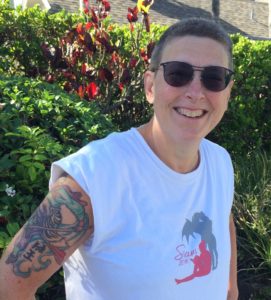 Brenda Murphy writes short fiction and novels. She loves tattoos and sideshows and yes, those are her monkeys. When she is not loitering at her local tea shop and writing, she wrangles two kids, one dog, and an unrepentant parrot. She reviews books, blogs about life as a writer with ADHD and publishes photographs on her blog Writing While Distracted. You can find her on Facebook by clicking here.
Brenda Murphy writes short fiction and novels. She loves tattoos and sideshows and yes, those are her monkeys. When she is not loitering at her local tea shop and writing, she wrangles two kids, one dog, and an unrepentant parrot. She reviews books, blogs about life as a writer with ADHD and publishes photographs on her blog Writing While Distracted. You can find her on Facebook by clicking here.
Website: www.brendalmurphy.com
Books available at
Guest Post: World Building with Jeffe Kennedy
It’s always a pleasure to “visit” Brenda here. If only we lived closer in real life!
But, since we can’t meet for coffee to chat, she’s asked me to talk a bit about how I do my world building. I can tell, because she referenced how I am the queen of spread sheets, that she’s imagining elaborate world building spreadsheets tucked away on my computer.
Really, it’s not so.
I mean, I *am* the queen of spreadsheets, so what I do keep track of is partly on spreadsheets, yes. The scary truth, however, is that I don’t do much detailed tracking of my worlds at all.
Most of it is in my head.
There’s a few reasons for this. The first and most relevant is that I believe time spent on world building tracking is time better spent writing. I know some writers, especially fantasy writers for some reason, spend HUGE amounts of time on building their worlds. They do tons of research and write thousands—sometimes hundreds of thousands—of words in world bibles. It’s fun for them, so great! But I know people who’ve spent YEARS working on their worlds. And don’t yet have a novel they’re happy with, if a completed one at all.
So, I begrudge that time, and I spend as little of it as possible on recording world-building details. That said, I know I’m lucky because I am able to keep a lot of it in my head. I’ve always had a vivid imagination, and an active daydreaming life, so my worlds are very real places to me, ones that I can mentally enter and wander around in.
A few things that I do when I need an answer to a world question.
Write
I write for discovery, which means that by the act of writing, I can enter the world and look around. If I need to know something I write about it.
Daydream
I’m a huge fan of “when you’re not writing you’re still writing.” I’m going to caveat that as when I’m not doing something like research, which occupies brain space. I mean while washing dishes, or cleaning house, or driving, or gardening, or even sleeping. I daydream about my worlds and that fills in fun details.
Ask My Assistant
This is my big cheat. I don’t want to spend my time recording details, but I’m perfectly happy to pay my assistant to do it! She keeps track of stuff. And if she doesn’t have it written down, she goes and looks it up in the books and comes back with an answer.
Ask My Readers
Sometimes I throw a question out to my readers via the private Facebook group we have (https://www.facebook.com/groups/JeffesCloset/), or sometimes on my public pages. I’ll do this when I’m looking for a nuance that’s not easy to look up, like if I ever gave the impression one character was another’s aunt or their cousin. I also ask my readers to name stuff if ideas aren’t coming to me. Their suggestions are always a kick.
Record Timelines
The one thing I *do* resort to spreadsheets for is calculating ages and timelines. Especially with The Twelve Kingdoms and The Uncharted realms books, I’m looking at about three generations now, and characters acting simultaneously in different parts of the world. I have to extract from what I’ve written and do the math from there. This feels very much like the conversations I have with my mother when we try to remember where we spent a family birthday celebration in 1996, and who was there. Only I can’t go back to the novels to piece that together!
But that last detail is revealing in that my imaginary worlds are as vivid—sometimes more so—than my memories of real life.
Sometimes I think they’re very much the same.
About Jeffe KennedyJ
effe Kennedy is an award-winning author whose works include novels, non-fiction, poetry, and short fiction. She has been a Ucross Foundation Fellow, received the Wyoming Arts Council Fellowship for Poetry, and was awarded a Frank Nelson Doubleday Memorial Award. Her award-winning fantasy romance trilogy The Twelve Kingdoms hit the shelves starting in May 2014. Book 1, The Mark of the Tala, received a starred Library Journal review and was nominated for the RT Book of the Year while the sequel, The Tears of the Rose received a Top Pick Gold and was nominated for the RT Reviewers’ Choice Best Fantasy Romance of 2014. The third book, The Talon of the Hawk, won the RT Reviewers’ Choice Best Fantasy Romance of 2015. Two more books followed in this world, beginning the spin-off series The Uncharted Realms. Book one in that series, The Pages of the Mind, has also been nominated for the RT Reviewer’s Choice Best Fantasy Romance of 2016 and won RWA’s 2017 RITA® Award. The second book, The Edge of the Blade, released December 27, 2016, and is a PRISM finalist, along with The Pages of the Mind. The next in the series, The Shift of the Tide, will be out in August, 2017. A high fantasy trilogy taking place in The Twelve Kingdoms world is forthcoming from Rebel Base books in 2018.
She also introduced a new fantasy romance series, Sorcerous Moons, which includes Lonen’s War, Oria’s Gambit, The Tides of Bàra, and The Forests of Dru. She’s begun releasing a new contemporary erotic romance series, Missed Connections, which started with Last Dance and continues in With a Prince.
In 2019, St. Martins Press will release the first book, The Orchid Throne, in a new fantasy romance series, The Forgotten Empires. Her other works include a number of fiction series: the fantasy romance novels of A Covenant of Thorns; the contemporary BDSM novellas of the Facets of Passion; an erotic contemporary serial novel, Master of the Opera; and the erotic romance trilogy, Falling Under, which includes Going Under, Under His Touch and Under Contract.
She lives in Santa Fe, New Mexico, with two Maine coon cats, plentiful free-range lizards and a very handsome Doctor of Oriental Medicine.
Jeffe can be found online at her website: JeffeKennedy.com, every Sunday at the popular SFF Seven blog, on Facebook, on Goodreads and pretty much constantly on Twitter @jeffekennedy. She is represented by Sarah Younger of Nancy Yost Literary Agency.
https://www.facebook.com/Author.Jeffe.Kennedy
https://twitter.com/jeffekennedy
https://www.goodreads.com/author/show/1014374.Jeffe_Kennedy
Invest in Yourself
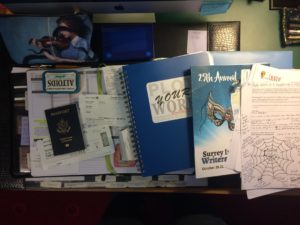 This past month I signed a contract for my third novel. And as anxious as I was to start my forth, because starting a new project is the best way for me to deal with the stress/anxiety/freak-out of submitting a manuscript for review. I make it a point to take some time between novels to study my craft, either by attending a conference, taking an online class, reading books about the craft of writing, and/or reading widely in my genre.
This past month I signed a contract for my third novel. And as anxious as I was to start my forth, because starting a new project is the best way for me to deal with the stress/anxiety/freak-out of submitting a manuscript for review. I make it a point to take some time between novels to study my craft, either by attending a conference, taking an online class, reading books about the craft of writing, and/or reading widely in my genre.
Why? Because on one level, writing is about doing that, siting down and putting words on paper. Nothing can replace that practice. There is no way to “hack” becoming better at writing than by writing and practicing your craft. I’m at the journeyman point in my career, with a collection of short stories, two novels published and a contract signed on a third. I’m not a beginner. But I am not seasoned writer with twenty novels to my credit either. I was not an English or Journalism major and I don’t have a MFA, and I want to make it clear: none of the above degrees are necessary to write a novel.
But it is possible to improve your craft with out signing up for formal education. You can invest your time and money to learn new ways to communicate your ideas and entertain your readers. I’m a health professional and educator by training and am all about making plans to achieve your goals. In order to construct an educational plan for your writing career look at reviews of you work. What do readers complain about? And I’m referring to thoughtful reviews here, not troll-type reviews. What problems do your editors point out? Pacing? Structure? Plotting? Character development?
Here are some thoughts on ways to address recurring problems in your manuscripts. Have a problem with pacing? Study screenplays, or take a screen-writing class. Issues with dialogue? Study stage plays, watch movies from the 30’s and 40’s when special effects were limited, and dialogue had to carry the story. Problems with plotting and structure? Read, read, read in your genre, take time to see how the novelist did what they did by making an outline of the novel. Flat characters, or poorly designed character arcs? Read biographies, ethnographies, and memoirs, connect lived experiences with human behavior and character arcs. Struggling with world building and setting? Study filmmaking and photo journalism to see how setting is as much a part of the story as the characters.
Writers conferences offer opportunities to learn about the craft of writing but not every one has time, money, mental, and physical health required to attend a writing conference. If a writing conference is not on your list of things to do, take advantage of the many low stress, free, or low cost resources for writers. My number one recommendation for resources is the public library. Most libraries are free, or low cost, and once you are a member you can use interlibrary loans to get just about any book or movie you want. Many libraries have a way to provide digital loans, saving you time, and the hassle of remembering to return your books/films/music. If you live near a university or college, check out their library and their theater productions. Creative Live offers courses on screenwriting, (https://www.creativelive.com and no, not I’m not getting paid to recommend them, they often have sales on their courses, so it pays to sign up for their newsletter.
Indie Film Academy (http://www.indiefilmacademy.com) is free as is Ted Talks (https://www.ted.com/talks) for interviews and lectures about writing, inspiration, and living a creative life.
Take time to invest in yourself and your writing career. You and your career are worth the effort.
Guest Post: Jeffe Kennedy
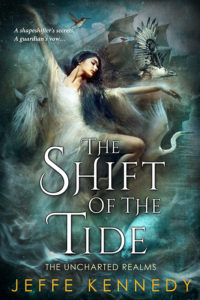 Jeffe Kennedy is here and has been kind enough to answer a set of questions I asked her. She set to release the third in The Uncharted Realms series. I have a review of The Shift of the Tide that I will post next week. The cover is just as gorgeous as the writing inside. It is a very worthy addition to the series.
Jeffe Kennedy is here and has been kind enough to answer a set of questions I asked her. She set to release the third in The Uncharted Realms series. I have a review of The Shift of the Tide that I will post next week. The cover is just as gorgeous as the writing inside. It is a very worthy addition to the series.
Imagine Jeffe and I sitting together sharing a glass of wine and talking. If you know either of this, it will not be hard.
Here’s JEFFE,
It’s fun to be here, virtually visiting my friend, Brenda. We had a great time drinking a lot of free wine together at the Siren’s conference in Denver last fall.
Brenda asked me an interesting set of questions: Who do you write for? Who do you have in mind when you write a story? An audience? A specific person? Or yourself?
It’s something that newbie writers get asked a lot, but that I haven’t thought about in a while. I always found the question hugely aggravating back in the day. It seemed that two kinds of people asked it – writing teachers/critiquers and agents. Who is the audience for this book? They’d ask, in this earnest, quasi-helpful way. To my ear it sounded like the agents were saying, “Can you think of more than five people who would buy this?” and the teacher/critiquers were dancing around telling you that it was a hot mess that no one could possibly want to read.
Beyond the annoying subtext, I also hated the question because I never knew the answer. The first image that sprang to mind was always one of those street shots of commuter time in New York City with thousands of people walking up and down the sidewalks. I felt like I was supposed to freeze-frame that and circle likely faces.
Look! My audience! Out there… somewhere.
People were hung up on this question. Who are you writing for? Some advice-giving types would nod sagely and say you should have one special person that you tell your stories to. Kind of a combo soul-mate/muse. I love my husband and he’s great support, but he doesn’t read fiction. I’ve had a lot of first readers over the years. Usually several at once, which I guess makes me a polygamist, special reader-wise.
But I like how Brenda phrased this: Who do you have in mind when you write a story?
Because sometimes that happens. I hear enough from my readers that I know by now which ones will love certain aspects of a story. I write parts and smile, thinking of them wriggling in delight. Sometimes I put in a detail that I know will mean something to one person, and it’s a way of sending them a hug and a wink.
Still, for the most part, having anyone’s reaction in my head while I’m writing is a problem. I have a sign over my desk that says, “What would you write if you weren’t afraid?” I look at that when I find myself anticipating reactions to what I’m writing, good or bad. For me, that “afraid” means worrying about what other people will think. And that just gets in the way.
The best writing – and by that I mean, the kind that flows without pause, that seems to come to me from another place, not necessarily the best quality or most inspired, though they’re often the same – happens when I have no one in mind.
Maybe that’s why I always hated that audience question. While I truly believe the cycle of art is completed when it reaches another person, I also think it’s best born and nurtured away from anyone else’s gaze. It’s like quantum physics – as soon as someone else’s consciousness touches the thing, it changes. There’s a time for that, and it can be an important part of the story’s eventual growth, but not during drafting.
So, Brenda, when I write, I try to have nothing and no one in mind. Not even myself.
About Jeffe Kennedy
Jeffe Kennedy is an award-winning author whose works include novels, non-fiction, poetry, and short fiction. She has been a Ucross Foundation Fellow, received the Wyoming Arts Council Fellowship for Poetry, and was awarded a Frank Nelson Doubleday Memorial Award. Her award-winning fantasy romance trilogy The Twelve Kingdoms hit the shelves starting in May 2014. Book 1, The Mark of the Tala, received a starred Library Journal review and was nominated for the RT Book of the Year while the sequel, The Tears of the Rose received a Top Pick Gold and was nominated for the RT Reviewers’ Choice Best Fantasy Romance of 2014. The third book, The Talon of the Hawk, won the RT Reviewers’ Choice Best Fantasy Romance of 2015. Two more books followed in this world, beginning the spin-off series The Uncharted Realms. Book one in that series, The Pages of the Mind, has also been nominated for the RT Reviewer’s Choice Best Fantasy Romance of 2016 and is a finalist for RWA’s RITA Award. The second book, The Edge of the Blade, released December 27, 2016, and is a PRISM finalist, along with The Pages of the Mind. The next in the series, The Shift of the Tide, will be out in August, 2017. A high fantasy trilogy taking place in The Twelve Kingdoms world is forthcoming from Rebel Base books in 2018. She also introduced a new fantasy romance series, Sorcerous Moons, which includes Lonen’s War, Oria’s Gambit, The Tides of Bàra, and The Forests of Dru. She’s begun releasing a new contemporary erotic romance series, Missed Connections, which started with Last Dance and continues in With a Prince. In 2019, St. Martins Press will release the first book in a new fantasy romance series, Throne of Flowers. Her other works include a number of fiction series: the fantasy romance novels of A Covenant of Thorns; the contemporary BDSM novellas of the Facets of Passion; an erotic contemporary serial novel, Master of the Opera; and the erotic romance trilogy, Falling Under, which includes Going Under, Under His Touch and Under Contract. She lives in Santa Fe, New Mexico, with two Maine coon cats, plentiful free-range lizards and a very handsome Doctor of Oriental Medicine. Jeffe can be found online at her website: JeffeKennedy.com, every Sunday at the popular SFF Seven blog, on Facebook, on Goodreads and pretty much constantly on Twitter @jeffekennedy. She is represented by Sarah Younger of Nancy Yost Literary Agency.
https://www.facebook.com/Author.Jeffe.Kennedy
https://twitter.com/jeffekennedy
https://www.goodreads.com/author/show/1014374.Jeffe_Kennedy



